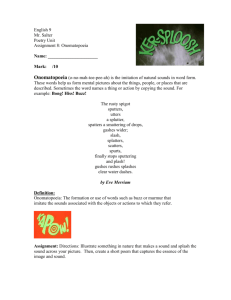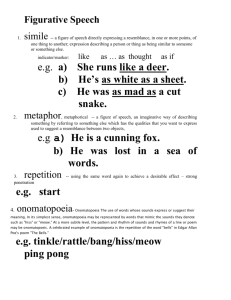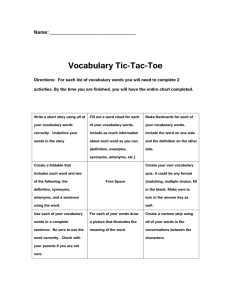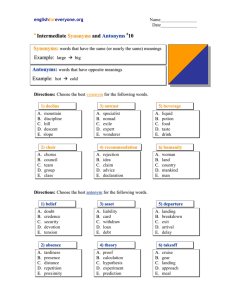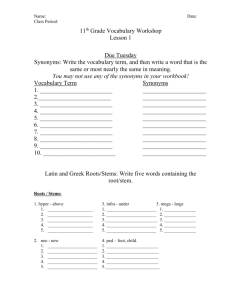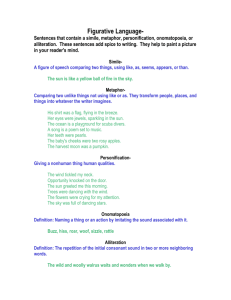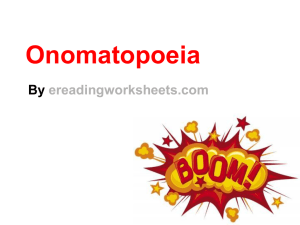English Language Arts
advertisement
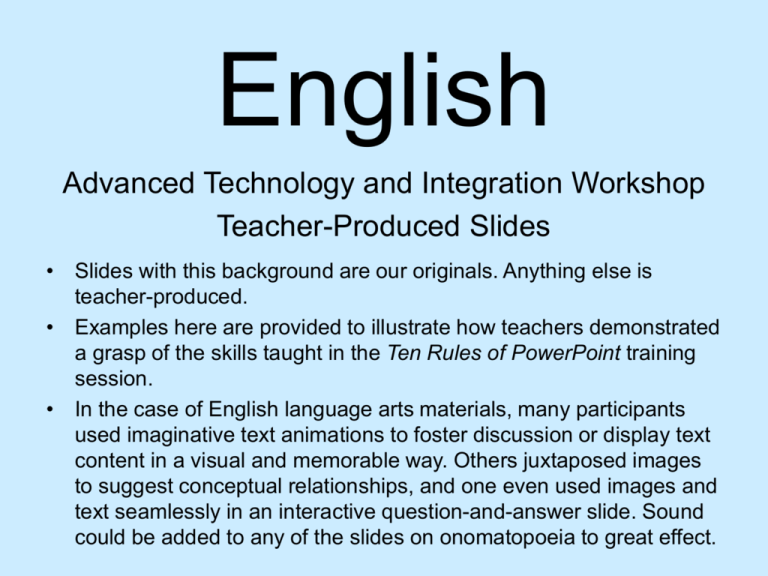
English Advanced Technology and Integration Workshop Teacher-Produced Slides • Slides with this background are our originals. Anything else is teacher-produced. • Examples here are provided to illustrate how teachers demonstrated a grasp of the skills taught in the Ten Rules of PowerPoint training session. • In the case of English language arts materials, many participants used imaginative text animations to foster discussion or display text content in a visual and memorable way. Others juxtaposed images to suggest conceptual relationships, and one even used images and text seamlessly in an interactive question-and-answer slide. Sound could be added to any of the slides on onomatopoeia to great effect. Compare and Contrast • Write a one-page essay comparing and contrasting the news article and the Pecos Bill story. Compare and Contrast Write a one-page essay comparing and contrasting the news article and the Pecos Bill story. Onomatopoeia Crash! Bang! Clang! • Onomatopoeia is the use of words that imitate the sounds they represent. • The words literally make the sounds in onomatopoeic words as “buzz,” “crash,” “clang,” “hiss,” “squeak,” and “boom.” • What other onomatopoeic words can you think of? Synonyms Are the Same • A synonym is a word that has the same or nearly the same meaning as another word. • Find synonyms for the following words from the story: – Broken – Sick – Good – Hard The Opposite of Synonym cold • An antonym is a word having a meaning opposite to that of another word. hot The Opposite of Synonym • List as many antonyms for the following words as you can: – Dry – Intense – Perfect – Mysterious Antonyms are Opposites • Brainstorm antonyms for the following words: Dry Intense Perfect Mysterious Wet Weak Slipshod Patent Read it! • Read the following paragraph. The day turned black as Travis skidded down the gravelly bank of the tiny creek and fought his way through thorny shrubs towards the meager protection of the tall trestles. He used the gun to push aside sticker-spiked branches, his ears filled with the constant roll of thunder than seemed to grow ever louder. Synonyms and Antonyms • Now rewrite the same paragraph in your own words using as many synonyms as possible. The meaning and actions of the paragraph should be the same. • Next, try rewriting the paragraph using antonyms. Your new paragraph should have the opposite actions and meanings from the original. Onomatopoeia • Onomatopoeia is the use of words that imitate the sounds they represent. • The words literally make the sounds in onomatopoeic words as “buzz,” “crash,” “clang,” “hiss,” “squeak,” and “boom.” • What other onomatopoeic words can you think of? “buzz” “Clang” “Boom” What other onomatopoeic words can you think of? Find it! • Go back through the story and locate examples of onomatopoeias. • When are the words usually used? • How does the use of onomatopoeias change your experience of the story? Find it! BOOM! • Go back through the story and locate examples of onomatopoeia. • When are the words usually used? • How does the use of onomatopoeia change your reading experience? buzz Crash! How to: • When using onomatopoeias, try not to read them in your normal reading voice. • Try reading each of the words as a sound effect, with emphasis! Voice Inflection • Inflection is the alteration in pitch or tone of the voice. • Think of why inflection might be important when using onomatopoeia. • How will these two skills help you when reading or writing a story?
